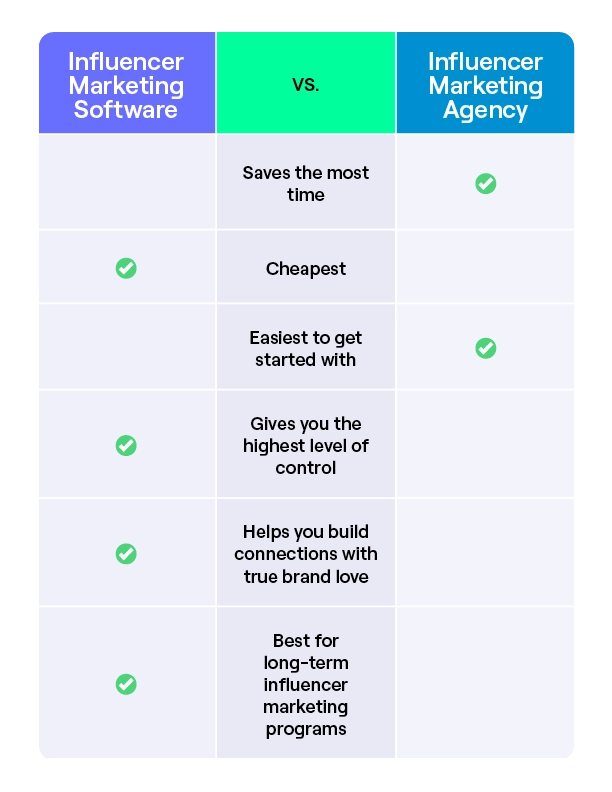Reading Time: 24 Minutes
Today’s marketers know that influencer programs are a pathway to increased brand awareness, improved sentiment, and high ROIs. But like anything that’s worthwhile, it can take a lot of time, which may not be feasible if you have a small team.
When a brand wants to take on influencer marketing but doesn’t necessarily have enough resources to run it (or take it to the next level), two main options typically get thrown around: influencer marketing software and an influencer management agency.
Since each of these has its own advantages, it can be overwhelming to attempt to decide between the two. But as always, the team at GRIN is here to help. Let’s dive into the basics of both of these options.
Offload some or all of your creator management responsibilities onto GRIN’s influencer marketing experts. Chat with a team member to learn more.
Influencer marketing software (some people refer to these as creator management platforms) gives brands the opportunity to scale their program with various functionalities, including:
Influencer marketing software can assist with all aspects of influencer management and your campaigns, but not all solutions are the same. For the best results, make sure your chosen platform can do all of the following.
The best strategy for finding the best partners for your brand involves a multi-tiered approach. After all, you don’t want to put all of your eggs in one basket.
An ideal influencer marketing software should offer a few different ways to help you find creators. Some things to look for are:
See Also: How to Find Content Creators Guidebook
An open and consistent line of communication is essential for any good business relationship, and being able to manage contracts in one place keeps your team organized and efficient.
An ideal influencer marketing software will include the ability to manage contact information, contracts, and more for each prospect and creator in your program. Some of the best platforms, including GRIN, will even integrate with your email provider to keep all of your influencer communications in one convenient location.
Keeping track of every piece of content your creators post on your behalf can be exhausting, especially if you’re regularly updating each post’s performance in a spreadsheet. A good creator management platform will aggregate the content, allow you to download it to your computer, and give you real-time results so you can see which posts are winning and which could use a little more work.
Paying your creators on time is essential for maintaining a good working relationship with them. Your influencer marketing software should track how much you owe your creators (whether through flat fees, commissions, or both) and allow you to pay right from the platform. And as a bonus, some software solutions will generate tax forms for your creators, so you don’t have to worry about them.
An ideal influencer marketing software should also provide reports and analytics to help you track the views, engagements, ROI, and more of each campaign, creator, and content piece. This will help you make educated decisions when it comes to future influencer marketing programs.
Plus, having a tool to generate reports quickly and easily will make it much easier to show your boss and stakeholders how well your program is doing.

Using influencer marketing software allows for complete management in a fully digital environment that benefits the marketing team, the brand, and the creators.
All the tools in an influencer marketing software are designed to save you time, whether it’s the automated email templates and sequences, content aggregation and data reporting, or product fulfillment capabilities. You can take all the time you save and put it towards other matters, like strategy and relationship building.
Managing a large team of creators can take a lot of time, and when you’re trying to do it on top of your other duties at work, things can fall through the cracks sometimes. However, an influencer marketing software can greatly increase the number of creators you can effectively work with at any given time.
Flipping between tools, apps, and spreadsheets can be a downright headache. But influencer marketing software solutions handle all of your duties, like messaging creators, paying partners, and tracking content, in one convenient place.
The ability to be in full control of your program is also a strong point for many influencer marketers. There is no need to wait for an agency to get back to you about potential influencers or the results of a campaign. Since you are directly involved in everything, you can receive information immediately, speeding up your marketing strategy.
The pricing structure for influencer software tends to be better for brands than that of agencies. Most platforms, including GRIN, do not charge commissions, which is typically the case for agencies. Instead, you know the flat fee you will pay right from the start, so there are no surprises.
Whenever you start getting your feet wet with new software, you’ll have to dedicate time to become familiar with it. Be sure to budget for this time when making your decision.
Creator management platforms are great for streamlining tasks you’re already doing with advanced tools and automation, but you’ll need knowledge and experience when coming in to get the best results.
For example, a platform can help you narrow down your influencer options to a list of 100 people, but you’d still need the strategic eye of an experienced influencer marketer to be able to pick the perfect partners from the group.
However, GRIN offers various resources to help you dominate the creator economy, making it perfect for beginners and pros alike. Check them out:
A company that already has a bit of experience in influencer marketing and is looking to scale its program is the best fit for influencer marketing software. This way, they have their existing knowledge they can leverage to create a huge, successful program.
A company can use influencer marketing software as long as they want. There isn’t really any point at which a brand can outgrow the capabilities of a creator management platform.

Influencer marketing agencies are similar to traditional marketing agencies but focus on influencer management and connecting creators with brands.
Digital and full-service marketing agencies may also include influencer marketing as one of their many offerings in addition to other disciplines like SEO, PPC, etc.
Influencer marketing agencies perform nearly identical roles to those of influencer marketing software.
They typically focus on connecting influencers and brands, then creating and managing the campaigns. The agencies usually take care of communications with the influencer and use analytics to develop and adjust strategies.
Agencies will analyze your campaign goals, budget, and more to find influencers aligned with your brand. Many agencies will ask for approval from the brand before firming up contracts and moving forward with any creators.
Influencer marketing agencies will use your goals to create custom content briefs for your chosen creators. These outlines typically contain information on the deliverables, payment methods, brand assets, and more. They’ll then provide these to the creators and negotiate with them over any revisions.
You can cross a whole list of to-dos and stresses off your schedule since you’ll have a team of influencer marketing managers handling every aspect of your program.
Agencies will review and collect content from your brand’s influencers, and if you’re working with a full-service agency, they can pass this content along to other teams to repurpose so you can get the most value out of your program.
The agencies will track the results of your program, make adjustments as needed, and deliver all of the information you need in a nice, easy-to-understand report.
See Also: Influencer Reporting Best Practices for Demonstrating ROI [+ Free Influencer Report Templates]
You can outsource your entire influencer marketing program to an agency and free up a bunch of time that you can use elsewhere to ensure your business is running smoothly.
Agencies have a ton of experience and know the ups and downs of influencer marketing, so you can rely on their expertise. This is especially helpful for brands that have little to no experience working in the creator economy.
You’ll have the opportunity to see your influencer marketing program (as well as your brand awareness, sentiment, and ROI) expand with only minor amounts of work on your end.
The ability to negotiate fees with agencies can be a positive or a negative point. It means that you will frequently end up paying more. To make it worse, there may also be hidden fees in the contracts that can further cut into your ROI.
Agencies have finite headcounts and time, meaning your program is limited by the amount of human power behind it. The agencies may utilize automation like GRIN to scale their efforts, but the cost of the platform will be passed onto your brand.
It can be difficult for a brand to build an authentic relationship with a creator when they have minimal contact. A lot of the time, this connection allows for brand love to really grow, which leads to the best and most authentic posts, so not having access can be a hindrance.
You must also keep in mind that just because an influencer marketing agency has experience, that does not mean it applies to your situation. There is no one-size-fits-all approach for influencer marketing, as each business has its own unique needs and demographics. Unfortunately, agencies want to get tasks done as quickly as possible to maximize their profit, so they may try to squeeze your company into a one-size-fits-all approach.
By contrast, if your marketing team or other in-house employees take care of influencer management via software, they will have the insights to customize their strategy for your company. After all, they are already familiar with it.
Some aspects of influencer agencies that seem appealing at first can actually take up more of your time than you think. For example, an agency may market that they take care of the influencer communications so that you do not have to worry about it. However, that means you have to wait to find out whether an influencer will work with you and other details until the agency tells you.
The same is true of analytics and results. Yes, the agency will likely analyze the results of influencer campaigns for you, but they will not give you the results until they do. This could take weeks, if not longer. You could have completed your own analysis and made changes for the better during this time. By contrast, if you control everything via the software, you can view analytics instantly whenever the urge strikes. There is no need to contact the agency and wait for their response.
Additionally, if the agency manually tracks results, they may not be as accurate as a software solution or provide fewer metrics. For example, GRIN calculates influencer media value, ROI, and more, which can be quite complicated to calculate without additional help.
This really comes down to the expectations you set with the agency at the beginning of your negotiations, though.
Small companies with a healthy marketing budget and very few employees or little experience in influencer marketing can greatly benefit from working with an agency.
We recommend evaluating your agency decisions on a bi-yearly or yearly basis. This gives you time to look through results and analyze costs while empowering you to make the best decisions for your brand.
You may continue to work with your existing agency, choose another agency, or take the work in-house as your team and expertise grow.
When developing and executing an influencer marketing strategy for a brand (or several), the features within creator management platforms can help you save time without losing your human touch. GRIN is the perfect solution for influencer marketing agencies looking to maximize their efforts.

If you like the idea of best-in-class influencer marketing software and the option for an agency-level approach, GRIN’s Professional Services offering is just what you’re looking for.
GRIN Professional Services allows you to tap into seasoned influencer marketing professionals to simplify the complex process of building and managing a creator program. With this offering, GRIN’s all-star creator management team becomes an extension of your own, empowering you with expert support to meet your unique needs.
There are two support options within GRIN Professional Services:
This option gives your brand tailored support where you need it most. For example:
With this full-service program management option, you can delegate all of your creator management responsibilities to GRIN’s Professional Services team. Together, you’ll define goals and craft a tailored program that runs like clockwork. From there, GRIN takes the reins, keeping you informed about program success while you focus on the broader strategy.
With GRIN Professional Services, you always have the option of learning from the GRIN team how to become self-sufficient with its influencer marketing software. With guidance from some of the best in the business, you can go out on your own with the industry’s leading creator management platform and take your program entirely into your own hands.
To appeal to the digitally native generation and take advantage of marketing to the masses, you need to work within the creator economy. Both creator management platforms and influencer marketing agencies achieve similar goals, but the right choice really depends on the needs of your unique brand.
If you do determine influencer marketing software is right for your brand, GRIN may be the answer you’ve been looking for. Schedule a free demo to learn how our #1 Creator Management platform can help you.
Our team keeps a finger on the pulse, so you’re always working with the latest information.